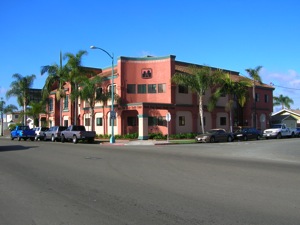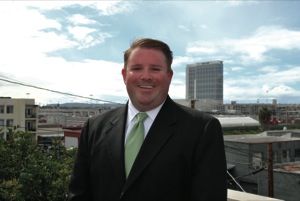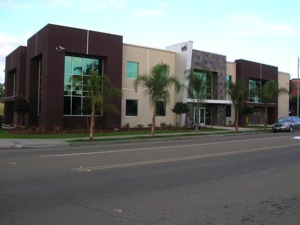
Imagine you’re a young transgender man or woman without insurance and need hormone therapy. Or you’re a lesbian who has lost her job with health benefits and has discovered a lump in her breast. Or you’re a gay man living on the streets and need HIV monitoring and medications. Who do you turn to? Where do you go for help?
Family Health Centers of San Diego is a non-profit community health center organization whose mission is to provide compassionate, affordable, high quality care to everyone, especially uninsured, low-income and medically underserved persons. Established in 1970, the operation has grown to include thirty-three locations, including 13 primary care facilities, 3 dental care clinics, 1 HIV clinic, 3 mobile units and comprehensive supportive services.
The need for affordable health care has never been greater. By some estimates, as many as 600,000 San Diego County residents, including 150,000 children, lack health insurance.
In 2011, Family Health Centers provided essential and life-changing health care for more than 165,000 individuals, during more than 625,000 patient encounters. But the care does not come without a price. Family Health Centers estimates that it costs an average of $165 for a standard primary care visit, and funding is always a concern. To meet the need, Family Health Centers partners with numerous local businesses and corporations, and also relies on government grants and donations from caring citizens.
I mention this because I recently had the opportunity to speak with Ben Avey, government and media relations liaison for Family Health Centers (FHC), to talk about their work and where they’re going.
Lance Ryder: What does FHC do well? How could FHC be improved?
Ben Avey: What we do well is provide a broad range of high-quality health care to people most in need. The breadth of our services is a direct result of our commitment to meet the necessities of the local community. But it also presents us with a challenge as we strive to let those in need know that we’re here for them. Many people know us as the largest provider of HIV prevention and treatment services in San Diego County, yet they don’t know that we also provide prenatal and pediatric services. Others may know us for Tuesday/Thursday Night Clinic, our STD clinic for gay men and transgender people, but don’t know that we also offer dental services and mental health services. We need to do a better job of telling our story and encouraging those we serve to share their story.
What impact will sequestration and associated federal budget cuts have on FHC programs?
It’s a sad reality that as the need for affordable health care and supportive services continues to increase, funding for those programs continues to go down. The same has been true since the beginning of the economic downturn and will continue to be true with sequestration. The programs hardest hit will be those that we struggle to fund but continue to operate in order to meet an unmet community need. San Diego is very lucky to have strong representation in Washington, D.C. and we hope that they will help find a resolution to this matter soon.
What impact do you anticipate the Patient Protection and Affordable Care Act will have on FHC services?
Our mission has always driven us to serve those who are most in need, and we likely already serve many of the people who will become insured when the law is fully implemented in 2014. However, it has given us the opportunity to raise the bar and make sure that we are providing those patients with the highest quality of care and presenting new patients with the opportunity to choose Family Health Centers of San Diego as their medical home.
In recent years, we have expanded our system of health centers to include new or expanded health centers in Lemon Grove, City Heights, downtown and Chula Vista. We have a new health center under construction in Southeast San Diego and a school-based health center under development in City Heights.

We’re aware that millions of people in California will remain uninsured even after the law is implemented, and it’s our mission to ensure that they, too, have a medical home at Family Health Centers of San Diego.
The Centers for Disease Control has reported an increase in syphilis cases among gay men. Have you also seen an increase in infections?
We are very active in working to identify and treat people with STD infections. We offer testing in a variety of locations including our Tuesday/Thursday Night Clinic.
We report data related to STD’s to the County of San Diego. For specific STD data, I would defer to the County of San Diego HIV, STD and Hepatitis branch.
How can San Diego LGBT Weekly readers help FHC? Are donations tax deductible?
Family Health Centers of San Diego is a 501(c)(3) organization and all donations are tax deductible. Donations can be made on our Web site at fhcsd.org, or by calling 619-515-2562, or emailing jamiew@fhcsd.org.
Family Health Centers of San Diego could not operate without the support of local community partners, whether they are government agencies, social groups or individual donors who care. We were very fortunate to be selected by Bears San Diego as their charity of choice for their annual Bears Care Rummage Sale in 2012, and hope to build similar relationships with other philanthropic organizations.
Let’s talk about Family Health Centers’ budget. What percentage goes to patient programs and what percentage goes to pay administrative costs and salaries?
Due to the changing nature of health care, it is very easy to confuse the line between patient programs and administrative costs. Health care is more than a doctor in an office providing an exam. It’s having someone help you enroll in safety-net insurance programs like Medi-Cal or the Low Income Health Program. It’s having health educators in the community teaching people about safer sex and prevention. It’s about caring for the whole patient, rather than waiting for them to arrive at the health center when they are sick.
Donations to Family Health Centers of San Diego support our ability to provide health care to those who have the greatest need. For uninsured patients, there is often a wide gap between the amount they pay us for services, based on our discounted sliding fee scale, and the actual cost of care. Donations to Family Health Centers of San Diego help us bridge that gap to ensure that our affordable, high quality health care services remain available and accessible to everyone.
Where will FHC be in five years? What’s on the horizon?
In five years, we will be wherever the community needs us to be. Since our founding in 1970, we have worked to identify and meet the needs of the local community and that’s what ultimately drives the direction and growth of our organization.

RESOURCES:
FHCSD HIV Services www.fhcsd.org/services/hiv.cfm
Gay Men’s Health www.gaymenshealth.org
County HIV/STD Statistics tinyurl.com/hiv-std-stats












I have to say that for the last couple of hours i have been hooked by the amazing posts on this site. Keep up the wonderful work.